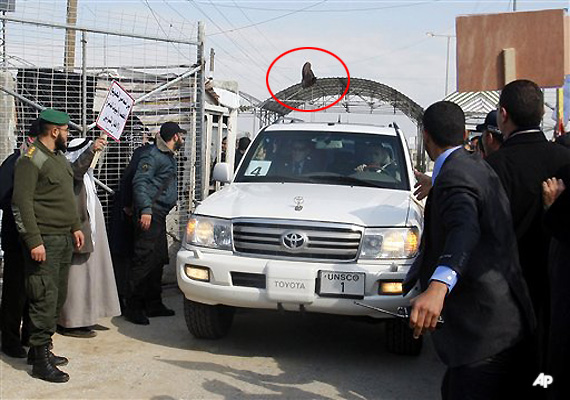Beit Hanoun (Gaza Strip), Feb 2: Palestinians tried to block the U.N. chief from entering the Gaza Strip and flung slippers at his armored convoy on Thursday, the second day of Ban Ki-moon's mission to the region to keep informal peace talks alive.
About 40 relatives of Palestinian prisoners held in Israeli jails gathered at the Erez Crossing between Gaza and Israel, hoisting posters with pictures of their loved ones and signs in English and Arabic reading, "Ban Ki-moon, enough bias to Israel."
Two of them threw slippers at his car -- an insulting gesture that is associated with an Iraqi protester who hurled shoes at former U.S. President George W. Bush at a news conference in Baghdad in 2008.
The Gaza prisoners' relatives, angry that Ban would not be meeting with them, formed a human chain at the crossing in an effort to block his vehicle, but Hamas security forces moved them away so Ban could enter the coastal territory.
"We came here in a symbolic message to Mr. Ban Ki-moon that Palestinians from Gaza want to have the right to visit their children and loved ones in Israeli jails," said Jamal Farwana, a spokesman for Gaza prisoners' families. "He should make more of an effort to release the prisoners and we wonder why every time he avoids meeting families of Palestinian prisoners."
Israel holds about 7,000 Palestinian prisoners, after recently freeing more than 1,000 in exchange for a captive Israeli soldier. Relatives of prisoners from Gaza haven't been able to visit them in jail since 2006 because of strict restrictions on who can enter Israel from the coastal strip, which is run by Hamas militants violently opposed to Israel.
Ban is on a mission to the area to try to keep informal talks between Palestinians and Israelis going. In Gaza, he met with U.N. relief officials, aid groups and human rights organizations.
He also visited a U.N.-funded housing project in southern Gaza, where protesters held up signs saying, "We want to lift the siege on Gaza" -- referring to Israeli restrictions on the entry and exit to and from Gaza of people and goods.
Speaking to reporters, Ban thanked the people of Gaza for their "warm welcome."
"I met many people who were waiting for me at the entrance and I fully share their fear and frustration. That is why I am here," he said, referring to the incident at the border crossing.
"There is a very dire social, economic and humanitarian problem. People need to move freely ... I have urged the Israeli authorities to lift the restrictions completely and unconditionally."
Ban's visit was being heavily secured by Hamas security forces, but he will not be meeting with members of the Hamas government, who are widely shunned internationally over their refusal to renounce violence.
From Gaza, the U.N. chief was due re-enter Israel to visit a border town that has been pounded over the years by Palestinian rocket and mortar fire.
"All this violence must stop," he said in Gaza. "I would urge the Palestinians from Gaza: they must stop firing rockets on the Israeli side ... this killing of civilians is not acceptable."
Gaza gunmen broke a weekslong lull in violence after Ban's arrival in the region on Wednesday, firing a volley of mortar shells into southern Israel. They exploded in open fields without causing casualties.
Ban spent Wednesday meeting with Israeli leaders and leaders of the Western-backed government of Palestinian President Mahmoud Abbas in the West Bank.
He urged Israel to halt settlement construction and present detailed proposals for a border with a future Palestinian state. And he tried to persuade the Palestinians to continue low-level meetings with Israel that the international community hopes will evolve into serious negotiations.
Abbas has said the Jordanian-mediated meetings have run their course, but that he'll decide whether to resume them after consulting with the Arab League next week. Ban said he had urged the Israelis to provide some good will measures to build confidence between the sides.
Formal peace talks stalled more than three years, save for a brief three weeks in late 2010. The Palestinians say there is no point in negotiating as long as Israel continues to settle its citizens in the West Bank and east Jerusalem -- areas they want for their future state, along with Gaza.
Israel has rejected Palestinian demands for a settlement freeze ahead of any full-fledged negotiations. It says it wants to continue the exploratory talks and criticizes the Palestinians for imposing conditions on negotiations.

